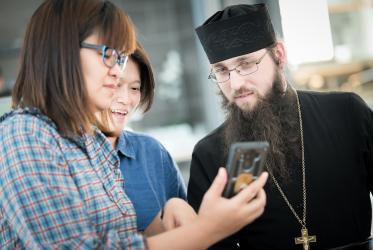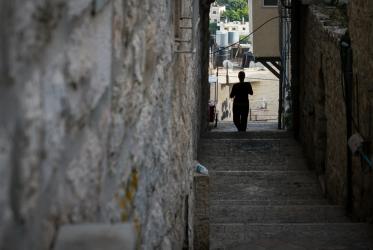Al-Azhar University is the biggest Muslim university worldwide with a history of more than 1,000 years and currently more than 70 different faculties all over Egypt. As early as 1936 (London) and 1939 (Paris) scholars of Al-Azhar have been invited to conferences in the Western world.
Anglican Communion
In 1995, the Anglican Communion started a closer cooperation with that institution and five years later (2002), the Anglicans and Al-Azhar signed an agreement of cooperation and of continuous dialogue. It was signed by the Grand Imam Sheikh Tantawi and the Archbishop of Canterbury Carey.
Roman Catholic Church
The Roman Catholic Church started its contacts and relations to Al-Azhar with the Second Vatican Council. Of great importance have been the documents: Lumen Gentium and Nostra Aetate. In 1964, the Vatican started the “Secretariat for non-Christians”, which since 1989 has been called the Pontifical Council for Interreligious Dialogue. Even before the end of Vatican II, Archbishop Frank König of Vienna visited the Al-Azhar University. Since then, contacts were established and individual invitations took place. Every year, at the end of Ramadan, the Vatican wrote a word of greeting to the university. Nevertheless, since Vatican II, it has been an up-and-down relationship. Therefore, it took more than 30 years before the dialogue between the two institutions was institutionalised. In 1998 the agreement between the Vatican and the Permanent Committee of al-Azhar for Dialogue with the Monotheistic religions (Cairo) for the Creation of a Joint Committee for Dialogue was signed. In the year 2006 Pope Benedict XVI gave at the University of Regensburg a paper, which lead to some misunderstanding and disruption of the established contacts. In 2011 the dialogue was suspended from the Al-Azhar side.
With the new Pope Francis, contacts have been established anew and one year after the visit of Sheikh Tayeb to the Vatican, the Pope visited Cairo on 28-29 April, 2017, giving a paper at the Interreligious Peace Conference organised by Al-Azhar and the Grand Imam. He addressed the interreligious audience by saying: ”Precisely in the field of dialogue – particularly interreligious dialogue – we are constantly called to walk together, in the conviction that the future also depends on the encounter of religions and cultures,” and then the two representatives hugged each other.
World Council of Churches (WCC)
Last year in September 2016 the Grand Imam from Al-Azhar University in Cairo visited the WCC in Geneva and the Bossey Ecumenical Institute. It was his first visit. A joint communiqué committed the two institutions to work together in the coming years on different issues, such as rejecting all forms of extremism and discrimination, to improve the representation and teaching on religion, to affirm the vital contribution that women can make towards peace-building and to strengthen the engagement of young people in our religious communities.
This time it has been the turn of the WCC to visit the Al-Azhar University with the Grand Imam and the Muslim Council of Elders (MCE).
The same week as the conference on Interreligious Peace, a WCC delegation met for one day with the MCE and Grand Imam Prof. Tayeb. The MCE comprises 15 members from mainly Sunni faith but also one representative from the Shiites and one Sufi. The topic given to that conference was “Citizenship”. The Grand Imam emphasized the fact that the Western world is propagating Islamophobia and warned that “today is Islamophobia, tomorrow maybe Christianophobia”. His intention is to seek comprehension between the religious leaders and therefore “we have to differentiate between religions and those incidents which took place in all religions in all times”, making allusion to the terrible bombing on Palm Sunday, which killed 45 Christians in Egypt.
Bishop Angaelos from the Coptic Orthodox Church pleaded for a proactive leadership, the “reactive leadership is good to solve problems”, but the proactive leadership is about showing the diversity of people and how they can contribute to the society.
One may question this type of high-level dialogue which takes place among different Christian leaderships and the Al-Azhar University. Those meetings do not imply that Christians in Egypt (or at other places) will have right away a safer life (anyway many Muslims and people of other faiths are also affected by the terrorist attacks all over the world!), but those visits and talks are pushing the trust and confidence between the representatives of the religions forward. The media all over Egypt (and most of the world) have been full of different reports of the meetings of that week, which brought together three Christian Popes, one Patriarch and one general secretary together with the highest representative of the Muslim world.
It is now their task (and the delegation members’ task) to break it down so that the culture of dialogue is spread among Christians and Muslims and that differentiations are made between the politically motivated terrorist attacks and the Muslim faith. As Christians on our pilgrimage of justice and peace, we can contribute to those aims wherever we are and work to oppose prejudices and general suspicion of Muslim believers. I do see signs of hope in one of the agreements, signed by the general secretary of the WCC and the Grand Imam to travel together into crisis areas. Another sign of hope is the Interreligious Summer School, which the WCC is offering each year at its Bossey Ecumenical Institute with some 20 participants from Jewish, Christian and Muslim backgrounds. This year, from 24 June to 14 July, it will be about peacebuilding.




